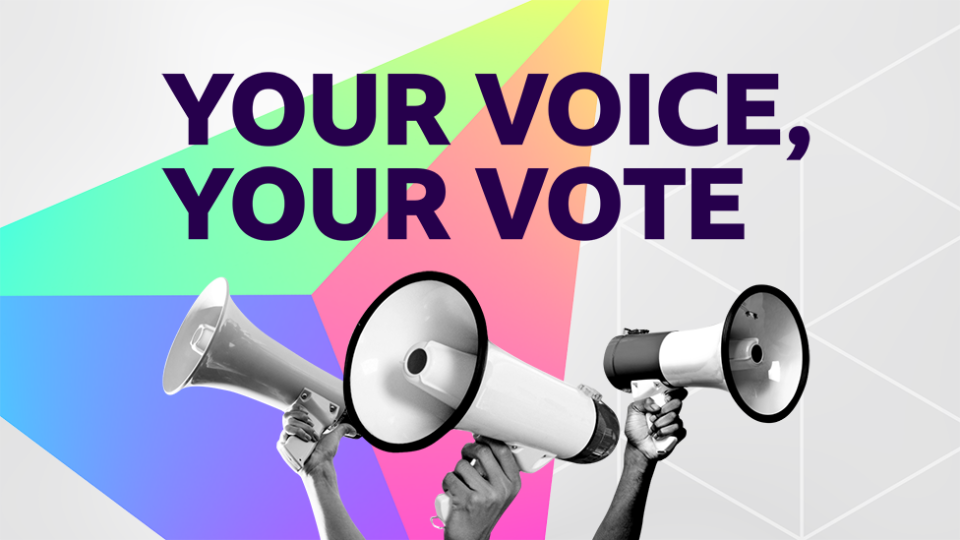My election plea: 'Help the neurodiverse find jobs'
Freya Smith knows how hard it can be to find a job, particularly if you are neurodivergent.
She applied for 100 posts over 18 months before finally finding a permanent role in IT support at the University of Northampton.
Ms Smith, 24, from Stanwick in Northamptonshire, has autism. She said she "was good at getting to the interview stage", but struggled with the interviews themselves because her condition meant she avoided eye contact.
She was one of the many people who got in touch with the BBC via Your Voice, Your Vote to tell us that improving support - particularly in the workplace - for those with neurodivergences was the most important issue for her in this election.
'Legislation vague'
Neurodiversity is a term used to describe the different thinking styles that affect how people communicate with the world around them.
It is an umbrella term - a word that includes autism, ADHD, dyslexia, dyspraxia, dyscalculia and Tourette's. It is sometimes referred to as an "invisible" disability.
The law states employers must make "reasonable adjustments" to make sure workers with disabilities, or physical or mental health conditions, are not substantially disadvantaged when doing their jobs.
But Ms Smith said the "legislation is too vague on what a reasonable adjustment is" in the workplace.
The government recently published a review into autism and employment and found only three in 10 people of working age are employed.
The report said this meant a large group of people were not able to lead independent and fulfilling lives, and that the economy was missing out on the skills and energy that autistic people could bring, " to the detriment of us all".
Ms Smith said the downgrading in December of the minister for disabled people, was also a blow.

Speaking of her own job search, Ms Smith said some interview questions were too vague for people with autism.
She would often ask for questions in advance, to prevent any misunderstanding, but this was refused by all but one potential employer - a bank.
The games and design graduate said she was upfront about her condition on application forms. Her peers secured jobs - often in the games industry - "relatively shortly after graduating".
"There's no mentions in any local communication about this issue, so I feel like I'm uncertain about who to vote for as I don't feel like it's been discussed either at a local or national level," she said.
What do the political parties say about support for people who have a neurodivergent condition?
Labour said: "We will support disabled people to work by improving employment support and access to reasonable adjustments.
"We will also tackle the Access to Work backlog and make sure people can try out a job without fear of an immediate benefit reassessment if it does not work out."
Its only reference to autism was when discussing plans for mental health. It also mentioned introducing full rights to equal pay for disabled people.
The Conservatives said: "Our ambition is to make this country the most accessible place in the world for people with disabilities to live, work and thrive.
"We are delivering on our Disability Action Plan to transform the everyday lives of people with disabilities."
Discussing health, it added: "We will continue to modernise autism and learning disability services."
The Liberal Democrats said it would provide "additional support and advice to employers on neurodiversity in the workplace", and would develop "a cross-government strategy to tackle all aspects of discrimination faced by neurodiverse children and adults".
It said it would tackle the disability employment gap "by implementing a targeted strategy to support disabled people into work, with specialist disability employment support".
This would involve "requiring large employers to monitor and publish data" on disability employment levels, pay gaps and progression, and publishing five-year aspirational diversity targets.
The Greens only reference to neurodivergency was in its support for children.
However, it said: "Green MPs will push for pay-gap protections to be extended to all protected characteristics including ethnicity, disability and sexual orientation."
Reform UK does not mention neurodiversity or autism. With regards to work, it says: "Reforms to benefit support and training will help people back into work. Particular focus on 16-34 year olds. Employment is critical to improving mental health."

Poll tracker: How do the parties compare?
Voting: Who can I vote for in the general election?
General election 2024: All BBC stories and analysis
Your Voice, Your Vote: Tell us the issues that matter to you
What really matters to you in this general election? What is the one issue that will influence your vote? Click the button below to submit your idea, and it could be featured on the BBC.


